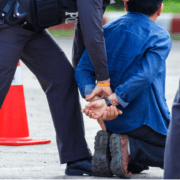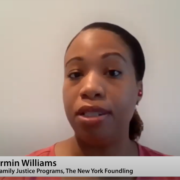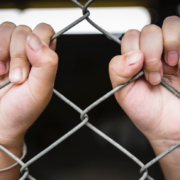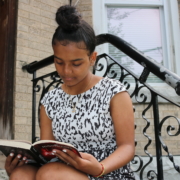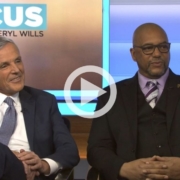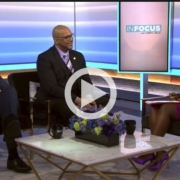Judge Michael Corriero discusses his work in the juvenile justice sphere in this interview with CBS News, including his role in our pioneering Families Rising program.
In an op-ed for New York Daily News, our CEO & President Melanie Hartzog discusses the benefits and need for Alternative to Incarceration programs – like Families Rising, The Foundling’s long-running ATI program, which has helped more than 500 adolescents and young adults avoid incarceration since its launch in 2012.
Programs like this in New York City are in jeopardy however, given upcoming budget cuts. “The Foundling and several other Alternative to Incarceration and re-entry programs have been told to expect $7 million in cuts in the coming fiscal year, which starts on July 1, and $9 million the following fiscal year. For every $100,000 of funding lost, we estimate that 16 young people won’t receive services,” says Hartzog.
“I spent three years as the director of the New York City Office of Management and Budget during the last mayoral administration. I know firsthand there are many ways to approach balancing the city’s budget. One is to strike budget lines on a spreadsheet, but the best way is to recognize the real value — and dollars saved — of programs over time. Alternative to Incarceration programs change lives and come with immediate and longer-term benefits, among them money saved,” Hartzog writes.
Read more at New York Daily News
On local television channel BronxNet’s Bronx Social Justice and Anti-Violence Forums, LaTasha Fermin-Williams, who leads our Juvenile and Criminal Justice programs, sat down with host Daren Jaime to discuss our use of evidence-based models to divert youth and adults from the juvenile and criminal justice systems and how we work to support families toward independence. Daren noted that “the impact [The Foundling] is making in youth and families’ lives is critical.”
Watch the interview below:
On local television channel BronxNet’s Bronx Social Justice and Anti-Violence Forums, our CEO and President Bill Baccaglini sat down with host Daren Jaime to discuss The Foundling’s juvenile justice and mental health programs. Watch the interview below:
By LaTasha L. Fermin, LMHC, Vice President of Family Justice Programs
The juvenile justice system is a maze for many young people not only in our community but across the country. There are far too many ways in, and too few ways out. Leading them out – or preventing them from entering in the first place – is about giving them a fighting chance to end generational cycles, go to college, have a career, and build a future without a criminal record shadowing them. Advocating for the teenagers and young adults in our community has led to recent changes in New York State law, including bail reform, that bolster the work we’re doing at The New York Foundling: diverting more young people from incarceration into programs like ours that are creating real sustainable change for the rest of their lives.
Teenagers and young adults involved with the justice system – or those are at risk of becoming involved through negative influences – need evidence-based interventions, including therapy programs that are supported by research, to address underlying issues such as trauma, family conflict, substance abuse, and verbal/physical aggression. They need holistic treatment that addresses challenges and barriers that they face daily in their family dynamics, in their community, and with regard to education, racial inequality, and mental health needs. Incarceration doesn’t resolve these root causes that are getting young people into trouble in the first place, nor does it deter them from getting into trouble again.
The Foundling was the first to provide evidenced-based services to youth and families in the juvenile justice system in New York City beginning in 2007. The services we provide are home-based and treat the whole family, not just the teenagers and young adults involved with the justice system. By coming into the home, Foundling therapists trained in trauma can better identify potential triggers and risk factors. At the same time, we can make sure the entire family’s needs are met—this includes the ability to have stable housing, a stocked fridge, and warm clothes during the cold winter months. If a parent or sibling has a substance abuse issue, we are also trained to treat those family members.
Collecting data from our evidence-based interventions is essential to ensuring our practice replicates the most successful outcomes from research. Our team tracks outcomes and measures success on a weekly basis, informing our future work and promoting continued success. The Foundling’s Kids Experiencing Young Successes (KEYS) program, for example, has a successful case completion rate of 88%; we wouldn’t have such a high rate without proper tracking, which allows us to focus on what works.
One positive change we are looking forward to with KEYS relates to helping more members of our community. Currently, all referrals into our program come from New York City’s Family Assessment Planning office, a program within the Division of Youth and Family Justice at the Administration for Child Services (ACS). Next year, we plan to increase the number of referrals we receive from school guidance counselors by 20%. These professionals are often among the first to identify when a young person needs help and will allow us to begin serving families before their situation is significant enough to be referred to ACS.
Many of the teenagers and young adults we’ve worked with are now on productive paths to stability, strength, and independence. If we’re to see continued increasing success, we need to advocate for and support the policies that are giving teenagers and young adults a fighting chance to get the help they need.
Instead of being labeled as the “problem,” it important to provide these teenagers and young adults with a restorative solution that will allow them to turn their lives around and look ahead to a brighter future.
For over 150 years, The New York Foundling has worked in partnership with our neighbors to ensure that everyone can meet their full potential when facing challenging situations. This hasn’t changed, and our staff continue to provide life-changing and meaningful support in light of the COVID-19 pandemic. This series shares how The Foundling’s many programs are responding to the needs of their community.
Youth who are tried as adults for crimes committed while under the age of 19 face the very real threat of being sentenced to adult prison with adult convictions that impact their futures. The Foundling’s Families Rising program is one of a select few that targets this high-risk population and provides them with evidence-based Functional Family Therapy (FFT) as an alternative to incarceration.
Families Rising works to reduce family conflict, substance abuse, recidivism, and violent behavior in the long term. In addition to its historically high rates of treatment completion, the program has demonstrated a significant impact helping participants with viable alternatives that avoid incarceration and a criminal record, leading them to stay in school and avoid re-arrest. The program is also estimated to save taxpayers millions of dollars each year in incarceration costs.
Throughout COVID-19, our dedicated Families Rising team has continued to provide FFT treatment and support to youth and their families.
Before youth can be screened into programs like Families Rising, which is a rehabilitative alternative to incarceration, they have to wait for a court referral. With criminal courts closed due to COVID-19, referrals of youth to The Foundling’s Families Rising program have decreased dramatically. Virtual court hearings are at a minimum, reserved only for the highest-risk cases.
But for the many young people who are already enrolled in Families Rising, therapy sessions have continued during COVID-19 but in a telehealth format. “We’ve had more instances of rescheduling,” says Kimberly Sweeney, a Families Rising Supervisor. “Because of COVID-19, we cannot rely on popping up at someone’s home for a session, so we are now addressing potential attendance struggles as a clinical matter in therapy sessions.”
Negative peer influences, fights with family, and impulsive decision-making are the most common trouble factors for youth. “Kids do what other kids are doing,” says Kimberly, “Since other kids are staying home due to COVID-19, the kids we help are, too. So that works to our advantage.”
Family involvement is an incredibly important factor in the program’s success. “One of my kids wasn’t going to school,” Kimberly explains, “But then his older brother came home from college early because of COVID-19. Our client started logging into the remote learning platform and began sending screenshots of the work he was doing to both myself and his school counselor. His brother was such a good influence. He reinforced all the skills and good behaviors we were trying to teach.”
And moments like this one couldn’t happen if youth are tried as adults and put in adult prisons. “Flooding the criminal justice system isn’t going to help kids make better choices, go to school, or improve their family and community relations,” Gomattie states, “It’s not going to fix recidivism.”
“If the risk of punishment at Rikers was enough to encourage people to behave differently, then it would have worked already,” adds Kimberly, “Families need more support addressing maladaptive behaviors, so their kids don’t end up in Rikers.”
“We need more programs like Families Rising—programs that actually address the issues that got the kid arrested in the first place,” Gomattie continues, “If we don’t treat the root causes, how are we going to produce any real lasting results?”
To learn more about how The New York Foundling is responding to the COVID-19 pandemic in New York, visit our emergency response page. Stay tuned for more stories from the frontlines as we continue to support our neighbors on paths to stability and strength.
Read past posts in the ‘Our Work Continues’ blog series:
- Closing the Achievement Gap for Youth in Foster Care
- Community Services Keep Staten Island Families Connected
- Perseverance and Compassion in our Homes for Adults with Developmental Disabilities (Part 2)
- Perseverance and Compassion in our Homes for Adults with Developmental Disabilities (Part 1)
- School Based Mental Health Services still Mitigating Crises
- Bringing Day Habilitation into the Homes of People with Developmental Disabilities
- Foster Care Systems Supporting Families Despite Social Distancing Challenges
- Supporting Youth as they Age out of Foster Care
- Preventing Child Abuse for Families in Social Isolation
- Mobilizing a School to Support a Community
The Foundling’s CEO and President Bill Baccaglini appears on NY1’s In Focus with Cheryl Wills, along with Stanley Richards of The Fortune Society, to discuss prison reform and how the organizations are playing a role. WATCH HERE
Bill Baccaglini, CEO and President of The New York Foundling, joins host Cheryl Wills, as well as Stanley Richards of The Fortune Society to discuss criminal justice reform and The Foundling’s work in juvenile justice. WATCH HERE


